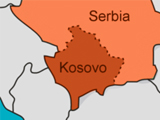|
|
TODAY.AZ / Politics
Russia worried over UN plans for Kosovo independence
31 May 2007 [09:06] - TODAY.AZ

During a heated discussion with the foreign ministers of Britain, Canada, France, Germany, Italy, Japan and the United States, Sergey Lavrov, the Russian foreign minister, made it clear that Moscow's goal was to hold direct talks between Serbia and Kosovo before considering the UN independence plan.
"The fate of Kosovo, the fate of Serbia on the whole should be decided through their direct talks rather than in New York, Potsdam or in any other formats," Lavrov said at the start of a meeting of G-8 foreign ministers in Potsdam.
Secretary of State Condoleezza Rice and Frank-Walter Steinmeier, the German foreign minister, publicly disagreed, saying there was a vital need for a UN Security Council resolution on Kosovo.
"We need to make it clear to our Russian partners that without a decision by the Security Council we simply won't make any progress on the western Balkans and Kosovo," said Steinmeier, who is playing host to the Potsdam meeting.
The foreign ministers were meeting for the last time before next week's summit of G-8 leaders in the north German resort of Heiligendamm where Kosovo will be one of the main issues on the foreign policy agenda. While diplomats said Wednesday they had expected no major breakthrough over Kosovo at the Potsdam meeting, there were surprised by the tough stance adopted by Lavrov.
A European diplomat who was at the meeting and who spoke on condition of anonymity, said Lavrov had compared Kosovo to Palestine. Lavrov asked the ministers why they were in such a hurry to grant independence to Kosovo while for 40 years they had failed to support independence for Palestine, the diplomat said.
The UN special envoy, Martti Ahtisaari, who devoted much of last year to inconclusive negotiations between Serbia and Kosovo, recommended in March that the European Union, supported by NATO, would supervise Kosovo's independence for at least two years. His plan, which was approved by the Kosovo Parliament but rejected by Serbia's leaders, envisaged a wide measure of autonomy and protection for the province's Serb community.
Since March, the United States has repeatedly said it would present a new resolution to the UN Security Council by June. This resolution would legally end the international protectorate under which the province has been governed since 1999, allowing it to move toward independence. Russia last month threatened to use its veto if that resolution were presented.
Steinmeier, addressing Lavrov directly during the meeting, asked if Russia would veto any new Security Council resolution that would end the international protectorate of Kosovo. Lavrov would not give a precise answer, according to another diplomat.
Lavrov said that if Kosovo achieved independence, then Ossetia and Abkhazia would have every reason to claim independence as well. Georgia's behavior toward the Ossetians and Abkhazians, he said, was much worse than Serbia's treatment of the ethnic Albanians of Kosovo.
Russia has consistently supported attempts by separatist leaders in Ossetia and Abkhazia to establish a wide measure of autonomy from Georgia. Over the past several years, there have been spasmodic clashes between Georgian and local separatist forces as the Georgian authorities tried to reassert control and protect its territorial integrity.
France's new foreign minister, Bernard Kouchner, said Kosovo was a specific case that could not be used as a precedent. He said the United Nations had not rushed into making a decision on Kosovo. Once the status of the province was finally resolved, it would bring stability to this part of the Balkans, he said.
Ahtisaari said that if Russia vetoed a new Security Council resolution, "it would weaken the UN's position." In an interview with a Finnish daily newspaper, Ahtisaari said it was not in the interests of the European Union to let the province's uncertainty continue. "Otherwise, it's clear the international community has failed. I think Kosovo is going toward independence in any case. The options are simple: to have as organized a solution as possible or a chaotic one."
By Judy Dempsey
/The International Herald Tribune/
URL: http://www.today.az/news/politics/41566.html
 Print version
Print version
Connect with us. Get latest news and updates.
See Also
- 21 June 2025 [14:14]
Anne Boyon in Shusha. Why were you showing off? - 21 June 2025 [13:26]
Azerbaijan’s parliament convenes next extraordinary session meeting - 21 June 2025 [11:11]
Macron kicked out of Niger - 20 June 2025 [18:20]
Istanbul to host 51st OIC Foreign Ministers Summit amid record participation - 20 June 2025 [15:29]
Azerbaijan, Georgia discuss strengthening parliamentary cooperation - 20 June 2025 [15:15]
Markus Rittel's Fantasies as consequences of Armenian "hospitality" - 20 June 2025 [15:12]
President Ilham Aliyev orders approval of cooperation plan with China under Belt and Road Initiative - 20 June 2025 [15:00]
President Ilham Aliyev approves Azerbaijan-China Agreement on International Multimodal Transportation - 20 June 2025 [14:22]
President Ilham Aliyev receives president of UFC - 20 June 2025 [14:09]
Names of generals who led Armenian operations during April clashes revealed in court
Most Popular
 President Ilham Aliyev receives CEO of bp
President Ilham Aliyev receives CEO of bp
 Next-gen air defense shield achieves full integration milestone
Next-gen air defense shield achieves full integration milestone
 Solovyov brought the Armenians to the top of their voices
Solovyov brought the Armenians to the top of their voices
 Canada expresses gratitude to Azerbaijan for assistance in Iran evacuation
Canada expresses gratitude to Azerbaijan for assistance in Iran evacuation
 Azerbaijan and World Bank discuss strategic directions of new CPF for 2025–2029
Azerbaijan and World Bank discuss strategic directions of new CPF for 2025–2029
 PM Ali Asadov meets with bp CEO Murray Auchincloss
PM Ali Asadov meets with bp CEO Murray Auchincloss
 Trial continues in Baku Military Court over mine-laying in formerly occupied Azerbaijani territories
Trial continues in Baku Military Court over mine-laying in formerly occupied Azerbaijani territories
